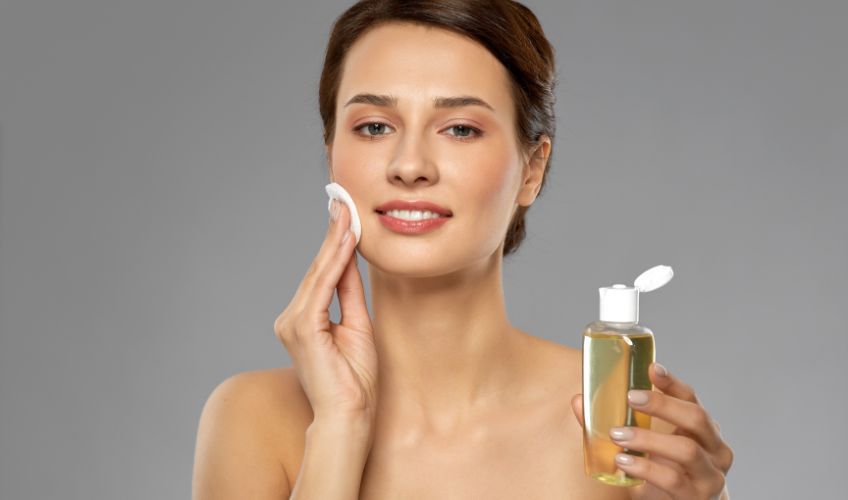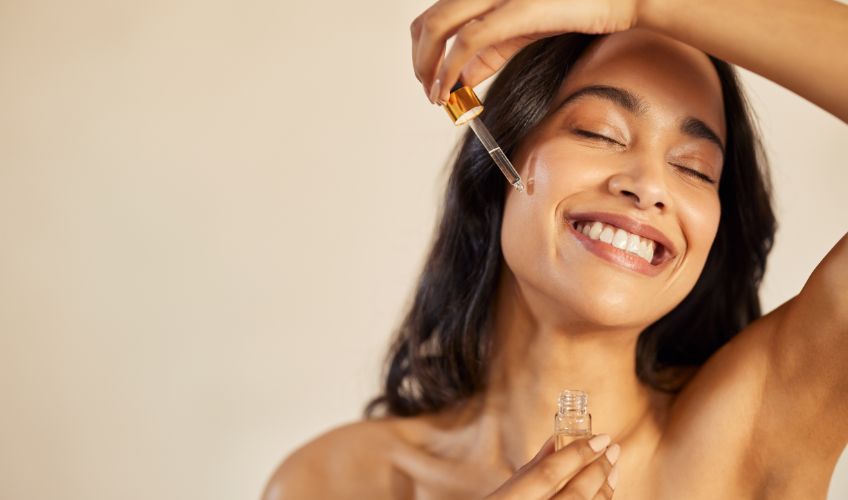The beauty toolkit now includes remarkable products that can permanently enhance the skin. The era of relying solely on oils and moisturizers in skincare routines is over. Nowadays, there is a wide range of options from hydrators and toners to exfoliators and serums, which often leads to confusion.
In this article, we will shine a light on two widely-used skincare products, toner and serum. Many people are still unclear about their specific roles, so we will compare toner vs serum and explore their differences in depth.
Keep reading!
canvaToner is a liquid skincare product applied after cleansing the face. Cleansers can disrupt the skin’s pH balance, and this is where toner proves useful. It restores the skin's natural pH, refreshes it, and removes residual cleanser and makeup. Furthermore, it replenishes hydration that diminishes post-cleansing.
Difference Between Toner and Serum
Toner

Toners are available in various formulations, including water-based and alcohol-based versions, and come in spray mist or pour-out liquid forms.
Toners can be used by all skin types and are a necessary addition to any skincare routine.
- Restores skin's pH balance
- Gently hydrates dry skin
- Reduces the visibility of open pores
- Treats blackheads and blemishes
- Enhances the absorption of subsequent skincare products
Different toners serve various purposes; therefore, it is beneficial to check the label and choose one with ingredients suited to your skin type and concerns.
If you are using a spray mist toner, spray it generously and evenly across your face after cleansing. For a pour-out toner, apply a few drops to a cotton ball and gently spread it over your face.
canvaSerums have a thicker consistency than toners and contain highly concentrated active ingredients that target specific skin issues. Serums are available to address hyperpigmentation, blemishes, skin brightening, tightening, and more.
Serum

There are essentially two types of serums:
Water-based: These have a gel-like consistency and should be used after toner and before moisturizer.Oil-based: Often referred to as facial oils, these should be applied after moisturizer.
While toner is simply sprayed and left to settle, serums require gentle massaging into the face.
It enables the product to deeply absorb into the skin, demonstrating effective outcomes.
- Tackles specific skin issues with its active component
- Minimizes wrinkles and other signs of aging
- Offers intense moisture to the skin
- Diminishes blemishes, marks, and spots
- Illuminates and firms the skin
The effectiveness of a serum is determined by its active ingredient. Serums may contain humectants, vitamins, minerals, herbal extracts, chemical exfoliants, and many other active compounds that address various skin concerns and produce noticeable outcomes.
Below is a comparison table to help differentiate between toners and serums across several categories for better clarity:
Choosing Toner
| Feature | Toner | Serum |
| Purpose | Primarily used to balance pH levels, eliminate residual impurities, and prepare the skin for better absorption of subsequent skincare products. | Formulated to penetrate deep into the skin with active ingredients, addressing concerns such as hydration, brightening, anti-aging, or acne. |
| Consistency | Generally a watery or slightly thick liquid. | More concentrated with a thicker consistency compared to toners. Textures can range from lightweight to creamy. |
| Application | Applied with a cotton pad or directly with hands after cleansing and prior to other skincare steps. | Applied directly to the skin post-cleansing and toning, but before moisturizer or other treatments. Can be patted or massaged in. |
| Ingredients | Frequently includes hydrating elements like glycerin or hyaluronic acid, and soothing agents such as witch hazel or chamomile. Might also contain exfoliating components like AHAs or BHAs. | Boasts a higher concentration of active ingredients like vitamins, peptides, antioxidants, or hyaluronic acid, tailored to particular skin needs. May include moisturizing and skin-repairing compounds. |
| Benefits | Balances the skin’s pH, cleans up any leftover dirt or makeup, reduces pore visibility, and refreshes the skin. | Targets specific skincare needs like hydration, firming, brightening, or acne treatment. Delivers deeper penetration for more precise outcomes compared to toners. |
| Frequency of Use | Generally applied twice a day, in the morning and at night, as part of the skincare regimen. | Usage frequency can vary based on the serum and its strength. Typically used once or twice daily, often in the evening. Can be used alone or layered with other serums. |
| Skin Types | Suitable for all skin types, including oily, dry, combination, and sensitive skin, depending on its formulation. | Available in different formulations targeting specific skin types and concerns, such as dry, oily, mature, or sensitive skin.Selecting a serum suited to your specific skin requirements is crucial. |
| Absorption | Penetrates the skin swiftly, leaving it refreshed and ready for further skincare applications. | Permeates deeply to deliver active ingredients effectively, potentially leaving a slight tacky or silky texture, depending on the formulation. |
| Example Products | Thayers Witch Hazel Facial Toner, COSRX AHA/BHA Clarifying Treatment Toner. | The Ordinary Hyaluronic Acid 2% + B5, Skinceuticals C E Ferulic Serum. |
As previously noted, selecting skincare products should be based on your skin type and concerns. Consider the following:
| Skin Type | Ingredients |
| Oily | Oil-free formulations, hydrosols, AHAs |
| Dry | Vitamin E, hyaluronic acid, glycerine |
| Acne-Prone | Salicylic acid |
| Combination | Rose water, vitamin E, vitamin C |
| Sensitive | Soothing agents - aloe vera, rose water, chamomile |
Ensure you opt for a water-based toner, as it suits all skin types and avoids irritation. Conversely, alcohol-based toners can dry the skin and strip its natural oils, causing more harm than good.
Choosing Serum
Serums are tailored to address specific skin concerns. Select one that matches your skin type and issues. It's prudent to read the labels before making a purchase.
Here’s what you can consider:
| Type of Serum | Skin Type/Concern |
| Hydrating | Suitable for all skin types |
| Brightening | Dull skin with dark spots, hyperpigmentation, and blemishes |
| Firming | Aging and mature skin |
| Clarifying | Oily skin, clogged pores, and frequent breakouts |
| Calming | Sensitive skin |
Conclusion
Since toners and serums serve distinct purposes and functions, incorporating both into your skincare routine is beneficial. Identify your skin type and concerns to choose the appropriate toner and serum, helping to restore your skin’s shine, youthfulness, and radiance.
Related Articles
